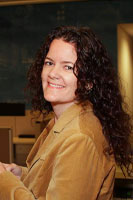For this year’s Cetis conference Building the Digital Institution we are delighted to welcome Audrey Watters, technology and education journalist to give our closing keynote. Audrey has written extensively about open education, technology myths, disruptive innovation and MOOCs on her own blog Hack Education but also for Inside Higher Ed, The School Library Journal, O’Reilly Radar, ReadWriteWeb, and The Huffington Post. As a taster of Audrey’s talk here is a short interview about how she became a technology journalist, her thoughts on open education, and thinking more broadly about innovation.
Your background is folklore what drew you into the world of educational technology?
There are lots of stories I could tell about my experiences with education and technology that brought me here. A teacher that brought the LOGO turtle into the classroom when I was in elementary school. Being a young mom, wanting to finish her college degree, and taking advantage of the opportunities afforded by a distance education program (which meant getting boxes of video lectures in the mail and sending back packets of worksheet. But now that’s digitized. So it’s awesome. Right?) I helped manage ed-tech conferences as part of the University of Oregon’s continuing ed program (I worked there before deciding to return to grad school), and (after I dropped out of grad school) I worked for ISTE, the International Society of Technology in Education.
How did Hack Education come about?
In 2010, I started freelancing for a number of technology blogs. I’d noticed a growing interesting among startups in ed-tech, and I thought it was an important issue to be covered. But my editors told me “no one cares.” “No one reads stories about education.” So I started my own blog.
I’m still sort of amazed that the domain “Hack Education” was available. I mean, even the Gates Foundation and Facebook use the phrase now to talk about their ed-tech hackathons. (Sigh.)
You have written and spoken about open education, what is your view of open education and innovation in the UK HE sector?
One of the things I plan to talk about in my keynote is this notion of how “innovation” in education is increasingly being defined as 1) something that comes via new technologies (as opposed to new practices or new ideas) and 2) something that comes out of Silicon Valley and 3) when it comes to education, comes from outside of educational institutions. These definitions squeeze out “innovations” that come from educators but highlights instead those that come from business and technology.
What’s fascinating to me is that I see so many innovations — by that, I mean new ideas and practices, not simply new devices and software — coming from within educational institutions, coming from outside Silicon Valley. I think that both the UK and the open education movement are the perfect examples here. Open education could be seen as a business innovation, I suppose. It certainly challenges the business model of publishers. But the significance of open education can’t simply be judged on dollars (pounds) saved or spent. Innovating around pedagogy and opportunity and learning doesn’t neatly fit into a definition of “innovation” that focuses on efficiency and markets.
What are the barriers that prevent schools, colleges and universities from engaging with open education?
I spend a lot of energy defending educational institutions from the investors and entrepreneurs (and politicians) who seem eager to privatize them, from those that want to profit off of various education policies and practices.
But I think it’s important to recognize too the ways in which educational institutions themselves are implicated here. Because schools have to come to terms with the traditions and practices that they perpetuate, practices that simply do not work in our modern, technology, Internet-enabled world. (Indeed, traditions and practices that never worked but for a select few.)
I think open education does challenge some of these traditions, particularly those that made education about prestige and about restricted access. What happens if we crack open that restricted access? What is the role of the institution in a world where, as some people argue, “you can learn anything you want on the Internet?”
Do you think the term “open” has become devalued?
“Open” has certainly been co-opted. (And not just in education either.) I see it used all the time in press releases. Open has become the latest adjective added to marketing-speak.
Certainly the term “open,” when used to talk about open source technology or open educational resources, has a pretty clear definition: there are licenses; there are legalities. But a lot of the time, I think people use the word in a much looser sense. Open access. Open enrollment. Open data. And mostly, it seems to be translated into “open for business.”
What technology innovation are you most excited about this year?
The end of email. Someone’s working on that, right?
Seriously, I think that the “Domain of One’s Own” initiative out of the University of Mary Washington is one of the most important ed-tech innovations. A “Domain of One’s Own” gives each student and faculty member their own namespace on the Web. It hosts their website (until the student graduates, when they are transferred control.) It encourages them to build their digital portfolio, control their digital identity. It gives them the necessary skills to do so.
Can you give us a taste of your keynote at the Cetis conference?
I plan to talk about the a-historicism of the US ed-tech industry: how they don’t know their past (or their research) and as such are destined to make mistakes that could easily be avoided. I want to talk about how knowing our ed-tech history is completely necessary for our building an ed-tech future.
Thanks Audrey!
The Cetis Conference is on the 17th and 18th June at the University of Bolton. Tickets for the two day conference are £100 until the 15th May

Pingback: Accessibility for E-learning: What We Can do Today and in the Future « UK Web Focus